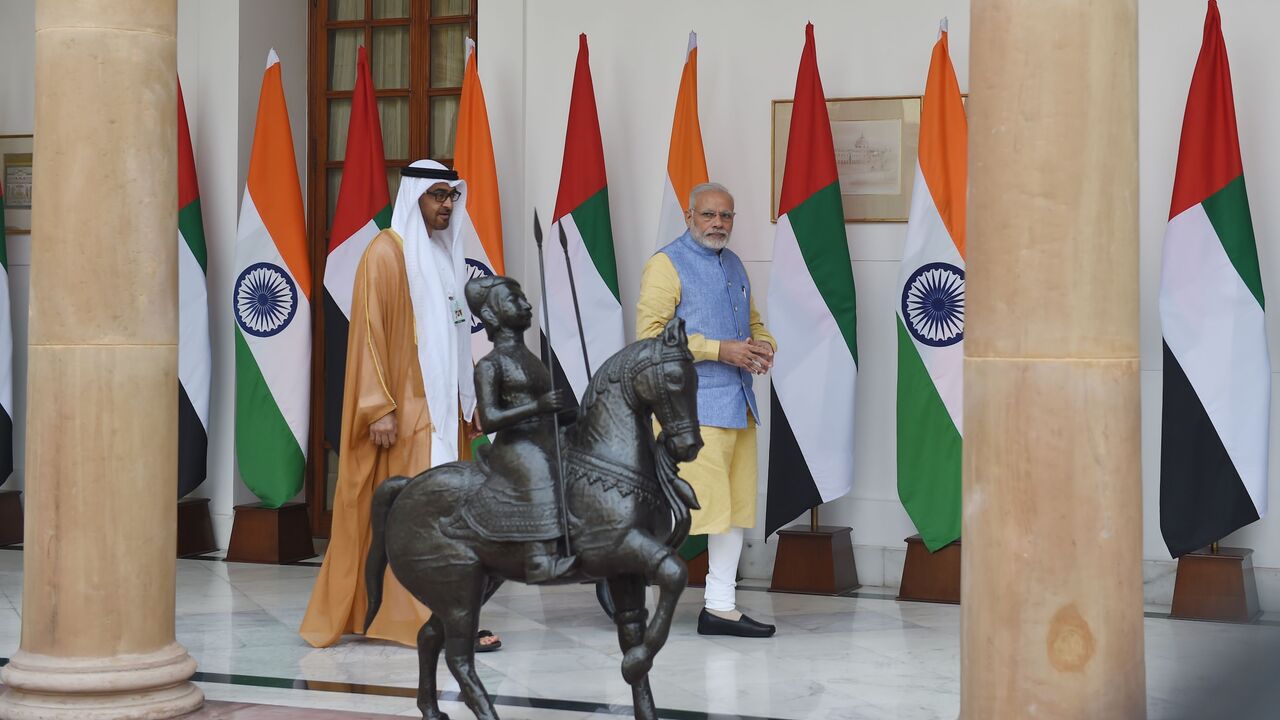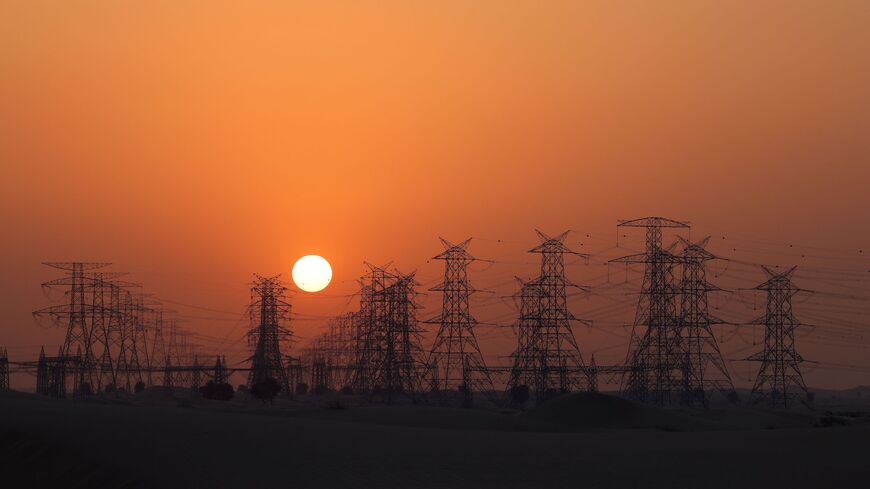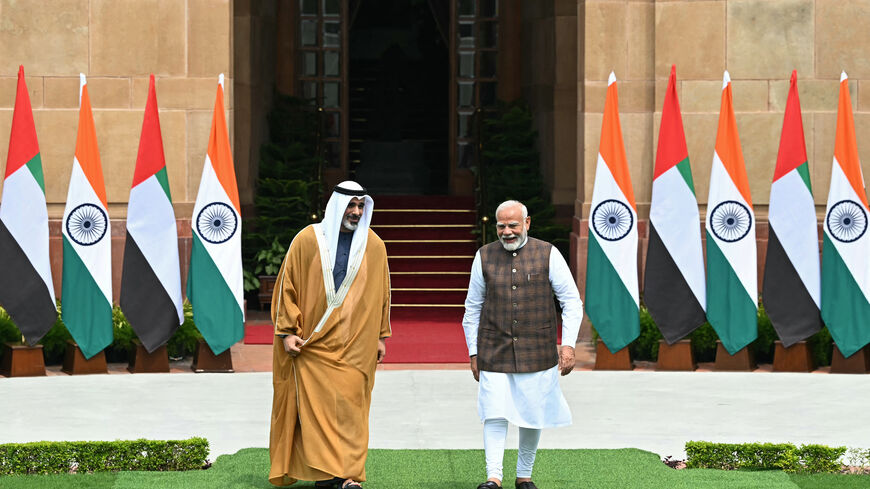India, UAE relations move from crude oil imports to nuclear cooperation
India, which sources 51% of its crude from the Middle East, is looking to strengthen strategic ties with the UAE. The South Asian country, which has significant nuclear energy capacity, signed its first nuclear cooperation agreement with Abu Dhabi on Monday.

DUBAI — India and the UAE have broadened their energy cooperation to include nuclear as South Asia's largest economy looks to forge closer ties with its key energy suppliers.
On Monday, both sides signed several agreements following the visit of Abu Dhabi Crown Prince Sheikh Khaled bin Mohamed bin Zayed Al Nahyan to New Delhi.
The draft of agreements largely focused on energy, notably oil, liquefied natural gas and, for the first time, nuclear energy.
India, the world's third-largest buyer of oil, obtains about 51% of its crude imports from the Middle East, accounting for around 4.85 million barrels per day. The UAE has historically been India's third-largest source of crude oil supply.
Nuclear talks
The biggest surprise in the cooperation agreements reached during the visit has been the inclusion of nuclear energy issues.
An MoU was signed between the Emirates Nuclear Energy Corporation and the Nuclear Power Corporation of India "to exchange expertise in nuclear energy development," the official Emirati news agency WAM reported.
"India is one of the few countries which has its own nuclear reactors. India has its own indigenous design reactor of about 700 megawatts capacity, which it is building in good numbers. So India does have certain expertise in technology," Amit Bhandari, a fellow at Mumbai-based Gateway House, said.
Atomic ambitions
The UAE recently added the fourth and final reactor to its 5,600 megawatt Barakah Nuclear Power Plant, the Arab world's only nuclear reactor. The project was spearheaded by a consortium led by South Korea's KEPCO at the cost of $20 billion.
It has been rumored that the UAE is considering building a second nuclear power plant, according to a report in Reuters in April. While the government has not confirmed plans for additional nuclear reactors, atomic power is considered a viable clean alternative in the Arabian Peninsula.
Nuclear energy is a key component of the UAE's plans to transition its economy away from oil and meet net-zero goals by 2050 per the Paris Agreement.
By 2050, the UAE plans to increase the share of renewables to 44%, with gas accounting for another 38% and clean coal and nuclear power set to make up 12% and 6% of the energy supply, respectively. With more nuclear capacity, the UAE will be able to rely less on imported gas. The country imports 2 billion cubic feet per day of natural gas from Qatar via the Dolphin pipeline.
India, which has 8,180 megawatts of nuclear generation capacity, is looking to currently treble the volume by 2031-32.
Indian nuclear design
The country's atomic power sector uses heavy-water nuclear reactors of a slightly older design.
The design, however, is economical. Bhandari noted that the Indian design of a nuclear reactor would cost an average of $2 million per megawatt of capacity. In comparison, Russian-made nuclear reactors would cost $3 million, and Western reactors such as those created by Westinghouse and Areva would cost $7 million.
"There is a very substantial cost difference," Bhandari said.
"One thing would be that I’m reasonably certain that the [UAE] government would be thinking of is how much more could they need, 10-15 years down the line, and what do they need for it? So I would not think that they will stop with the four reactors," he added.
Strategic reserves
India also holds 5.86 million barrels of Abu Dhabi oil in its strategic reserves in the southern Indian city of Mangalore. Abu Dhabi National Oil Company and Indian Strategic Petroleum Reserves are looking to expand the current volume of reserves as India remains concerned about energy security amid high oil prices and rising Houthi attacks along the Red Sea and Indian Ocean.
Abu Dhabi Crown Prince's visit to India also highlighted the fundamental aspect of the countries' relationship, which is "expanding economic cooperation," Kabir Taneja, a fellow at New Delhi-based Observer Research Foundation, said.
"But there are, of course, the other aspects to it as well, including energy security, countering terrorism or whether it's the safety of sea lanes and so forth," he added.
India and the UAE have also come closer together through the BRICS economic bloc, which Abu Dhabi joined in 2023.
BRICS partnership
India — which has often complained about the "Asian premium" included in the sales of oil from the Middle East to Asia — is hoping for closer economic and energy ties as a member of this group.
India, which has a net-zero deadline of 2070, later than most global economies, foresees itself continuing to import crude oil from the Middle East, for which it hopes it would secure fair pricing.
"The EU is talking about restricting the use or reducing the oil demand, whereas the interest of the UAE and Saudi Arabia lies in the opposite direction," Bhandari said.
"So there is an economic alignment which is already there. And I think it makes sense to be on the same platform," he added.







